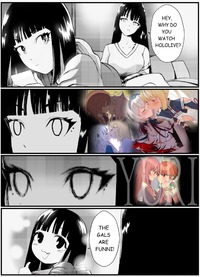By Zoe Crombie.
Banri Tada is a bright young student at a private law school who has just finished convalescing from a fall he experienced after his high school graduation that left him with no memory of his life or relationships from before that moment. Fortunately, he finds a friend in fellow first-year student Mitsuo Yanagisawa, and starts to uncover elements of his past as he continues his studies. In true romantic comedy fashion, he also finds himself involved with the intimidatingly beautiful Koko Kaga and mysterious second-year student Linda, who each grow close to our perpetually confused protagonist. As Banri’s memories re-emerge, these new relationships (that may, in fact, be older than he realises) become more complex, and he has to reconcile the events of his past with the possibilities of his future while navigating university and deciding on the kind of person he wants to become.
Amnesia is an oft-denigrated plot device that nonetheless can be used to great effect – particularly in stories that aren’t taking themselves too seriously. Golden Time definitely falls into this camp, as a romantic comedy that’s more about balancing potential love interests than uncovering some convoluted conspiracy. Though the amnesia element of the show does provide a level of intrigue, it’s watching the relationships unfold between characters that’s the real glue holding Golden Time together.
Golden Time is based on a series of light novels which were adapted into a manga shortly after. The series was created by Yuyuko Takemiya, who you might also know from the highly successful series Toradora!, another romantic comedy with a focus on budding relationships and love triangles. However, Golden Time differs in its more intense plot and confrontation of various social issues, bringing more drama to the slice of life format that Toradora! thrived in. But this doesn’t mean the anime is all doom and gloom – in fact, it may be a little too saccharine for some, as evidenced by its candy-coloured opening sequences and their bubble-gum-flavoured backing tracks.
The series was also created by the studio who made the anime adaptation of Toradora!, J.C. Staff. As the company behind beloved classics like Revolutionary Girl Utena and Azumanga Daioh, and a group of artists already familiar with Takemiya’s work, they were well placed to work on the Golden Time adaptation, putting their experience with a range of styles and genres to good use. The result is an anime that isn’t necessarily showy with its visuals for the majority of the running time, but one that nonetheless effectively captures the emotions of the characters at its core, conveying their joy and heartache with the sincerity that so many admire within anime.
As a seinen anime that takes place in a university setting, Golden Time has some of the more mature relationship drama and adult humour you might expect. However, it visually and narratively draws upon shojo romances in a lot of ways, not least in its pink and lacy title cards and wide-eyed protagonists, who all feel every single emotion on a gargantuan scale. This lends it a cross-audience appeal that isn’t always easy to find in anime, particularly romances, and means that it isn’t just restricted to older viewers. Clearly, Golden Time has had a significant impact on audiences of all kinds – you only need a cursory glance on YouTube to find all the Top Ten Saddest Scene compilations that clips from this show have made it into. And there are even occasional fantasy elements to spice up the show somewhat, including the spectral appearance of one of the more controversial anime characters in recent memory – if you know, you know…
In short, Golden Time is a crowd pleaser of an anime – it has a compelling plot with characters who are easy to love and relationships to root for, as well as an absolute cracker of an ending. Though technically for adult viewers, it has an easy-going feel that’s sure to appeal to most anime fans, whether you’re into shojo romance or goofy shonen comedy. J.C. Staff already had an impressive back catalogue as a studio, primarily from adapting light novel series, and Golden Time is another feather in their cap that easily stands alongside the best of their more recent releases as a true emotional rollercoaster of a show.
Zoe Crombie is an associate lecturer and PhD candidate at Lancaster University working on Studio Ghibli. Golden Time is released in the UK by Anime Limited.



